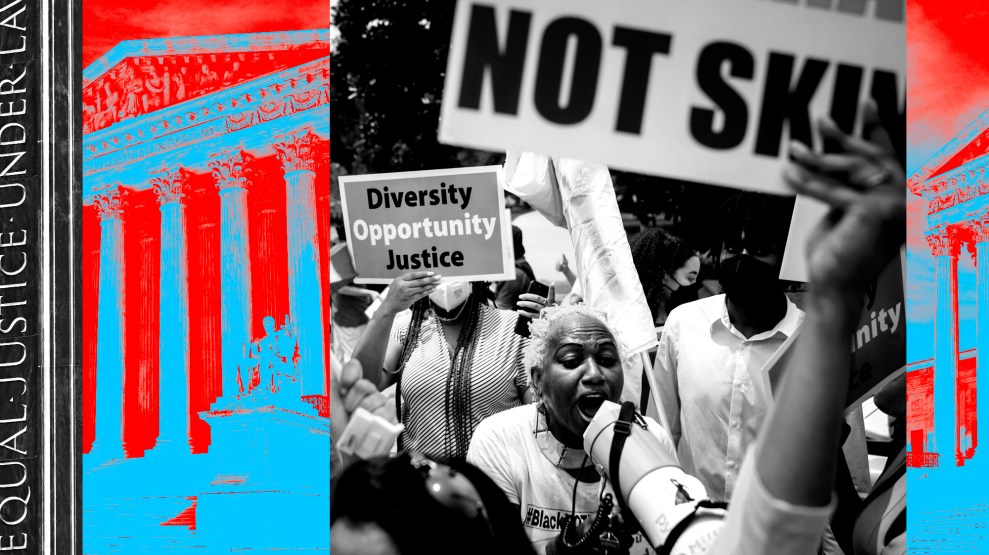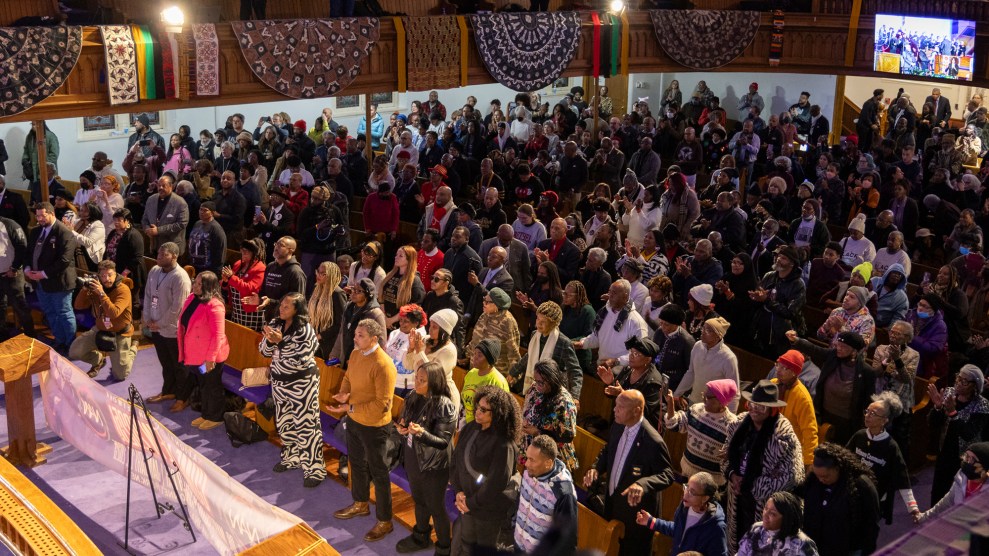
Mother Jones; Kent Nishimura/Los Angeles Times/Getty
Within 24 hours, two rulings from the nation’s highest court—one striking down the use of race-conscious college admissions, and the second gutting Biden’s student debt cancellation plan—rolled back years of progress towards greater economic justice and educational opportunity for students of color.
In these rulings, the Supreme Court has all but ensured the deepening of racial wealth inequality by undoing the chance to erase debt held disproportionately by Black Americans, and also decreasing access for students of color to elite US colleges—and the financial opportunity they can offer their graduates.
Biden’s student debt relief plan would have cancelled up to $10,000 in debt for low- and middle-income borrowers, and double that amount for borrowers from the poorest backgrounds. This plan would have zeroed out the debts held by about 45 percent of Black borrowers, increasing their wealth by up to 40 percent.
“The Supreme Court’s decision to strike down the President’s student debt program is a clear disregard for what millions of Americans need—especially Black Americans,” NAACP President and CEO Derrick Johnson said in a statement. “Education has long been regarded as a path toward generational wealth, economic liberation, and securing the American dream. Let’s be clear—student debt is killing that dream.”
This is in part because Black borrowers take out disproportionately more loans to pay for higher education—often because Black households have less saved to pay for children’s college, due to the racial wealth gap. Then, faced with labor market discrimination, Black borrowers often earn less and then pay down their debt more slowly, further expanding existing wealth inequality. In her dissent to the high court’s decision to undo race-conscious admissions, Justice Ketanji Brown Jackson zoomed in on the many ways in which America’s history of slavery and discrimination has fueled existing racial wealth inequality, which hasn’t let up much in decades. “The race-based gaps that first developed centuries ago are echoes from the past that still exist today,” she wrote. “Start with wealth and income.”
That financial gap is a key reason why many top universities have, for years, used race as a factor in their admissions: because history has ensured that in America race and wealth are linked—and in higher education, it is wealth, perhaps more than any other factor, that helps grease the wheels of success. Often it is private secondary schools that better prepare students to be competitive college applicants. Then, pricey test-prep classes and admissions consultants help facilitate entry to top universities. Once students arrive on campus, the skyrocketing costs of tuition cement existing socioeconomic hierarchies: Wealthy families pay their children’s tuition, while students from low- and middle-income backgrounds finance themselves with loans. When those students graduate, one group gets to keep their entire paycheck while the other shaves off chunk after chunk to pay back their debt, with ever-compounding interest, for several decades. Higher education, then, becomes a key engine by which the rich get richer, while the rest of us break even—at best.
Race-conscious admissions have not been enough to undo this system, but they have, at least, made a dent: Black families with a college degree have greater median wealth than those without one, and studies have shown that access to top institutions significantly boost the lifetime earnings of Black and Hispanic students who don’t come from wealthy backgrounds. But at the same time, thanks to ballooning tuition and slow income growth, more Black college graduates now hold student debt into their 30s—and their median wealth has decreased.
The Supreme Court had the chance to preserve two tools that could offer a path forward on this persistent problem, and a greater chance to equalize educational opportunity and financial security for all. Instead, the court’s conservatives chose neither—opting, instead, to uphold the myth that society is already equal enough.

















